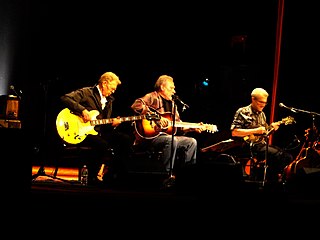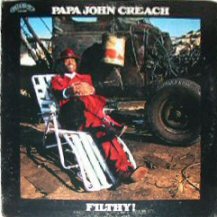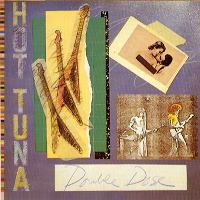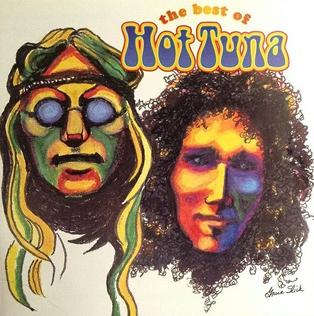
Hot Tuna is an American blues rock band formed in 1969 by former Jefferson Airplane members Jorma Kaukonen (guitarist/vocals) and Jack Casady (bassist). Although it has always been a fluid aggregation, with musicians coming and going over the years, the band's center has always been Kaukonen and Casady's ongoing collaboration.

Jorma Ludwik Kaukonen, Jr. is an American blues, folk, and rock guitarist. Kaukonen performed with Jefferson Airplane and still performs regularly on tour with Hot Tuna, which started as a side project with bassist Jack Casady, and as of early 2019 has continued for 50 years. Rolling Stone magazine ranked him No. 54 on its list of 100 Greatest Guitarists. He was inducted into the Rock and Roll Hall of Fame in 1996 as a member of Jefferson Airplane.

John William Casady is an American bass guitarist, best known as a member of Jefferson Airplane and Hot Tuna. Jefferson Airplane became the first successful exponent of the San Francisco Sound. Singles including "Somebody to Love" and "White Rabbit" charted in 1967 and 1968. Casady, along with the other members of Jefferson Airplane, was inducted into the Rock and Roll Hall of Fame in 1996.

Bark is the sixth studio album by American rock band Jefferson Airplane. Released in 1971 as Grunt FTR-1001, the album is one of the Airplane's late-period works, notable for the group's first personnel changes since 1966. The album was the first without band founder Marty Balin and the first with violinist Papa John Creach. Drummer Spencer Dryden had been replaced by Joey Covington in early 1970 after a lengthy transitional period in which both musicians had performed with the band.

Long John Silver is the seventh studio album by the American rock band Jefferson Airplane, and their last album of all new material until 1989. It was recorded and released in 1972 as Grunt FTR-1007.

Jefferson Airplane is the eighth and final studio album by San Francisco rock band Jefferson Airplane, released on Epic Records in 1989. Marty Balin, Paul Kantner, Grace Slick, Jorma Kaukonen and Jack Casady all returned for the album and supporting tour, though Spencer Dryden did not participate. The album and accompanying tour would mark the last time Jefferson Airplane would perform together until their 1996 induction to the Rock and Roll Hall of Fame.

Flight Log (1966–1976) is a compilation album by the American rock band Jefferson Airplane. Released in January 1977 as a double-LP as Grunt CYL2-1255, it is a compilation of Jefferson Airplane and Airplane-related tracks, including tracks by Jefferson Starship and Hot Tuna, as well as solo tracks by Paul Kantner, Grace Slick, and Jorma Kaukonen. Although primarily a compilation album, the album includes one previously unreleased song: "Please Come Back" written by Ron Nagle and performed by Jefferson Starship. "Please Come Back" is not available on any other release.

Hot Tuna is the debut album by the American blues rock band Hot Tuna, released in 1970 as RCA Victor LSP-4353. It was recorded live at the New Orleans House in Berkeley, California in September 1969. It peaked at #30 on the Billboard 200 album chart.

Burgers is the third album by Hot Tuna, the folk rock offshoot of Jefferson Airplane members Jorma Kaukonen, Jack Casady, and Papa John Creach, released in 1972 as Grunt FTR-1004. It was the band's first studio album, the previous two being live recordings. "Water Song" and "Sunny Day Strut" are instrumentals composed for this album. Hot Tuna did not release the song as a single until June 1982. In 1996, RCA released the CD box set Hot Tuna in a Can which included a remastered version of this album, along with remasters of the albums Hot Tuna, First Pull Up, Then Pull Down, America's Choice and Hoppkorv.

Manhole is the first solo album by Grace Slick, released in 1974 by Grunt/RCA Records.

Yellow Fever is the sixth album by the American blues rock band Hot Tuna, recorded and released in 1975 as Grunt BFL1-1238. The album was also released in Quadraphonic as Grunt BFD1-1238. The album rose to #97 on the Billboard charts.

Grunt Records was a vanity label founded in 1971 by Jefferson Airplane and distributed by RCA Records. Initially created to sign local Bay Area acts, the label later was used only for Jefferson Starship and Hot Tuna releases. The label ended use in 1987 after Grace Slick left Starship.

Filthy! is Papa John Creach's second solo album and the first with his band Zulu. The guitarist of Zulu would later be known as Keb' Mo'. The band Hot Tuna also makes an appearance on the album on the track "Walking the Tou Tou", which was written by Jorma Kaukonen.

Double Dose is the eighth album by the American blues rock band Hot Tuna, and their third live album. The album was originally released as a double-LP as Grunt CYL2-2545. After their 1977 tour, Jorma Kaukonen moved on to a solo career and Jack Casady joined the new wave band SVT. Hot Tuna would not perform together again until 1983. The album had its highest peak at #92 on the Billboard charts.

And Furthurmore... is a live album by the American rock band Hot Tuna. It was recorded on the 1998 Furthur Festival tour. It was released on October 12, 1999.

Pair a Dice Found is an album by the American blues rock band Hot Tuna. Released in 1990, it was their first studio album since Hoppkorv in 1976.

Final Vinyl is a Hot Tuna compilation album. At the time the album was assembled, Jorma Kaukonen and Jack Casady had stopped performing together and were on to newer endeavours. Kaukonen recorded a solo album, Jorma, and Casady joined the band SVT. Kaukonen signed to RCA Records and Casady moved to 415 Records. This marked the end of Hot Tuna on the Jefferson Airplane owned Grunt Records, so a "final" compilation album was assembled. Kaukonen and Casady reunited to perform as Hot Tuna in 1983 and moved to the Relix Records label, where they released material until the late 1990s.

The Best of Hot Tuna is a Hot Tuna compilation album released in 1998. It covers songs from all the Hot Tuna albums released on Grunt Records. Bill Thompson, former manager of Jefferson Airplane and Hot Tuna helped select the songs for inclusion. The artwork on the cover is a painting of Jorma Kaukonen and Jack Casady made by Grace Slick. The album was released as a double CD.

Historic Live Tuna is an album by the band Hot Tuna. It was released in 1985. Side A contains previously unreleased tracks from a live acoustic performance played on KSAN radio in 1971. Side B contains previously unreleased material from a live electric performance in 1971 recorded at the Fillmore West auditorium in San Francisco. The album was Hot Tuna's second release on Relix Records, and would be their last release until after the 1989 Jefferson Airplane reunion tour and reunion album, when they were signed to Epic Records for a short time before returning to Relix.

Live at New Orleans House: Berkeley, CA 09/69 is an album by the American rock band Hot Tuna. As the name suggests, it was recorded live at the New Orleans House music venue in Berkeley, California in September 1969. It was released in April 2010.



















